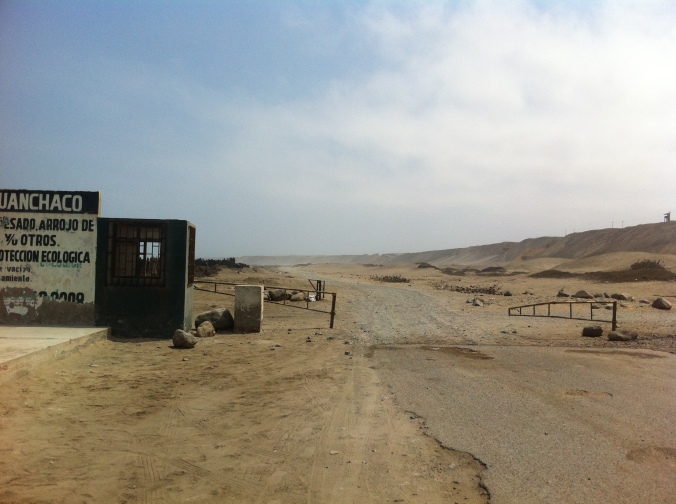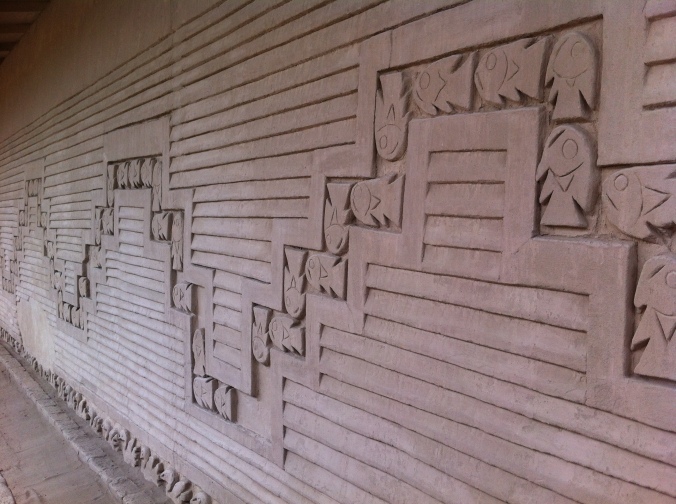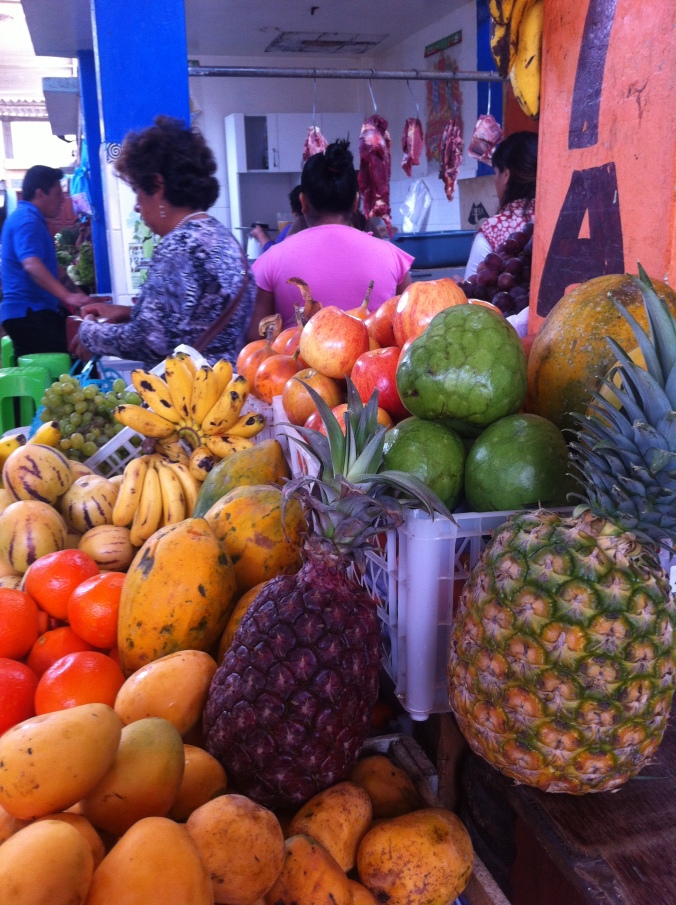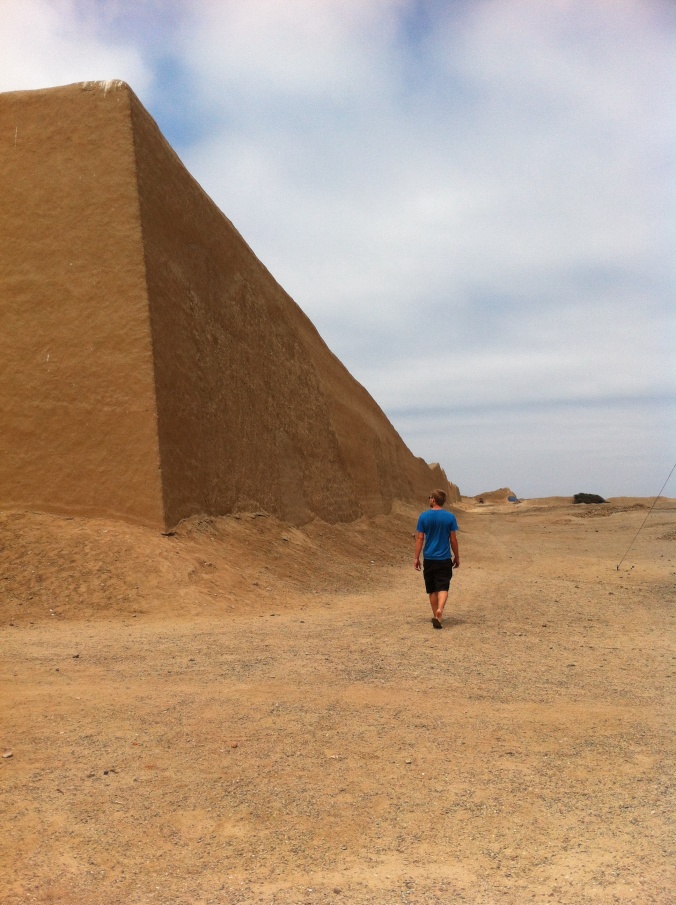I am writing this on my iPhone, the tiny white screen and jumpy autocorrect not really conducive to creativity. But so much has happened in the last couple of weeks! The sand I am sitting on is warm and coarse, the strong breeze that pulls my hair from my shoulders is chilly, raising goosebumps along my bare arms. We are in the north of Peru, in a little fishing come surfing village named Huanchaco. I just met a man named Reinata, who was sitting guard and armed with a pistol outside an abandoned looking shop front at the edge of town. We had a clunky conversation in Spanish, during which he asked whether I have children, and I told him that New Zealand is much colder than here.
The people here are friendly. Out of their way friendly. Not the outward, beaming smile friendly that you get in other parts of the world, but helpful and resourceful, a reluctant smile only tugging at their lips when you’ve said something that they like, when you’ve earned it.
When we arrived here from Lima we tried to catch a bus from the city out to Huanchaco. The men waiting outside the station told us that it was too hard, that we’d have to take a taxi, and the price quickly jumped from 12 soles to 22 soles. We told them it was too much, ignoring their outstretched arms and open car doors, the ever dropping prices being shouted at us. When they realised that they wouldn’t get a sale out of us they seemed happy to give up, and dropped the salesman persona while pointing us across the road to the bus. We waited on the dirty curb, marvelling at the strange contrast between the post-apocalytic looking town and the space age, uber modern bus station we had arrived into.
A Peruvian lady took us under her wing then. Clamping her handbag tightly under her elbow she hailed a colectivo and prodded us inside, where we stood in the tiny aisle, holding our bags and bent double. Twenty five other people all watched us curiously, and every now and then we would catch each other’s eye and suppress a laugh. The minivan bumped and lurched around the streets of Trujillo and taxis tooted, while a little boy hung out of the doorway, yelling at people walking outside.
We shuddered to a sudden stop and the woman asked again where we wanted to go. We told her Huanchaco, and in a flurry of asking and other passengers nodding and flapping their hands we were abruptly ejected and told to wait on the other side of the busy street. We walked across, bemused and unsure, and asked another woman in her cart full of magazines and lollipops where we should wait. She looked up from her magazine only for a second, using a finger to push her glasses back up her nose as she appraised us.
“Aca, aca,” she told us dismissively, returning to flipping pages. We waited. After about twenty five seconds another colectivo hurtled up to the curb, another little boy yelling, this time “Huanchaco Huanchaco Huanchaco!” We bundled ourselves in again, scoring seats and paid our two soles to the boy.
He can’t have been more than twelve. He hung an arm and a head out of the bus, all business and haggling and trying to short change people, still yelling “Huanchaco Huanchaco!” It was only later, when someone left some rubbish on the back seat that he laughed, and his boyish grin belied his business-like facade. It was almost surprising to realise then that he was still just a little boy. I watched his small, adept fingers counting coins, always trying for more, his thin palm outstretched. He slammed the old door closed again and hung out against its rattle, yelling for more people, like the bus and its offer of excitement was something to sell.
Out of the window the landscape was dusty and desolate, dogs played in the dirt in the abandoned streets. We stopped several times to pick up lipsticked women in the middle of the desert, their dark hair slicked back into tight ponytails and scuffed high heels waiting on litter strewn curbs.
The bus dropped us beside the pier in Huanchaco, and we were left in the relative quiet of a bustling marketplace, the roar of the sea in our ears and the smell of pelicans in our nose. We would have had no idea what was happening up until that point without the help of the locals.
We rented a double room for just thirty five soles at La Gringa hostel, showed around by the owner, La Gringa herself, a fifty something blonde woman from Kansas who jumped between sentences and intercepted each positive thought with a “Praise The Lord!” and beamed at us with bright blue eyes and white teeth.
We went out for dinner that night, ordering cocktails and seafood, more food than we could even eat, all for less than $24 NZD. Breakfast at the market today was about two dollars for both of us. Everything seems to cost ‘un sol’ here, and I think almost every person that we have bought something from has tried to short change us.
There seems to be nothing malicious about it, more an opportunist streak, just pushing the boundaries to see if we’ll notice. We always do, and when we ask for our change they pretend as though they forgot, or that they didn’t understand what we wanted to buy. It happens so often it’s almost endearing, like some strange ritual, enjoyable for both parties.
A couple of days ago we went to see the Chan Chan ruins, a huge adobe city just off the beach, where sheer seven metre walls rise out of the sand, still there from centuries ago. We walked around the ruins of the old palace in hushed silence then wandered back towards the main road, eating salty banana chips and a pack of something else we didn’t quite catch, but which tasted like dried kumara chips.
We stepped over the painted white rocks that marked the track to walk on the sands off the road, talking about scorpions and tarantulas and wondering if they have them in Peru, while following the spines of old walls still hidden in the ground. I guess when you have so many ruins you can be picky about the ones that you excavate. The sand shifted beneath us like snow crust, our footprints pressing down on still unrevealed ancient mud and stone. We kept yelling at each other excitedly, “man this is some Indiana Jones shit!”
A lone ice cream wrapper skittered along the sand beside the deserted road and Peruvian vultures circled above us, their shadows rippling across the ancient walls. The warm wind rushed in my ears, falling silent each time I turned my head.
There were Peruvian dogs there too, a hairless, black breed with reddish eyes, which look like a terrifying cross between a dementor and a rabid hyena. They hang around old temples, like some sort of freaky Playstation creatures.
Yesterday was our first day of doing nothing in two weeks, today our second. I spent the day in a bikini in the sun trapped courtyard, reading and drinking icy cold beers that sweated in the sun, leaving watery rings on the old wooden table. I could feel the sun soaking into my skin, warm and loving against my closed eyelids, the vitamin D soaking right through, permeating down into my bones.
That night I chatted to some surfers here for a week from NYC. We watched the sun lower in the sky, turning red as it dropped into the haze, before disappearing completely. The temperature dropped then, the cool evening wind rustling the palm fronds.
It’s strange, that in the last two weeks we’ve gone from the Colombian jungle to the Peruvian desert. It seems a world away. In Colombia we met a little girl in the jungle with a machete, and guards stood armed with machine guns while sucking on lollipops. The people look different in Peru too, and the accent is different. Easier, I think. Next step is Huaraz in the Andes, Peru’s hiking capital, then back to Lima, then down and around to Cusco and Macchu Picchu, before leaving through Bolivia.
It’s funny to think that when we arrived in South America we thought we’d have a shot at blending in. We thought that if we wore the right clothes (tight) and spoke enough Spanish (very unlikely) that maybe people wouldn’t notice that we were gringos. But there is absolutely no chance of us being mistaken for Peruvians. We look too different, our blonde-streaked hair and light eyes stand out from miles away.
We rode the metro in Lima after eating anticuchos – delicious heart skewers – and it was an incredibly strange feeling to look around and find twelve pairs of dark eyes quickly averted. Everyone seems to look at us, and to know immediately that we are not from here. But I don’t think that’s a bad thing, and even if it is there’s nothing we can do about it. All we can do is try to improve our Spanish, and maybe get better at handing over the correct change.
So far, I love Peru. There’s so much more than the Inca Trail here.
















Nice to hear from you again Holly – a great insight into a lesser visited part of Peru… and well done for writing it on an I-phone!